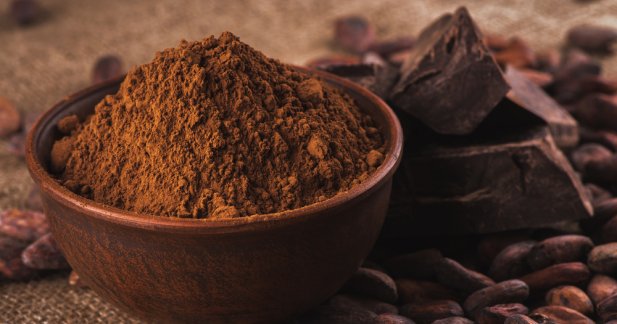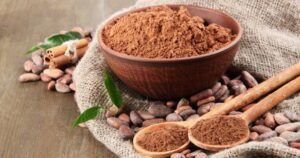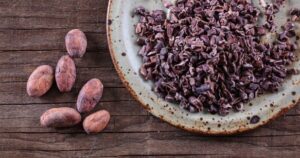
Most Common Cocoa Powder Substitutes
February 21, 2023
Cocoa powder is a stable in a baking household. Sometimes, even though you are not a baker, there’s still a high chance that you have a stash at home. But if you ever ran out of it, or you’re allergic, or you just don’t like it, you can easily swap it with simple ingredients you might already have at home. Here's how.
As a key ingredient in most chocolate recipes, substituting cocoa powder depends on what you will use it for. You should find something that is close to its texture and flavor. Cocoa powders can be Dutch-processed or unsweetened (natural), where the former is treated with an alkaline solution to neutralize its acidity levels.
What is Cocoa Powder?
Cocoa powder is the bitter unsweetened chocolatey powder that comes from the cacao bean.
Cacao grows from the tropical tree whose scientific name, Theobroma cacao, translates to “food of the gods” in Greek. It originated in the upper Amazon basin region (Brazil, Colombia, and Peru). Chocolates are made when cacao pods are harvested from the tree, then turned into cocoa, and then processed into the yummy chocolates that we all love.
This process starts with the cacao pods being harvested from the tree and opened to remove the seeds. They will be fermented for about 2 days up to a week to eliminate bitterness, and then will be cleaned and dried under the sun.
After drying, the beans will be roasted and then peeled to produce the cacao nibs. At this point, some cacao nibs are already being sold and consumed. The next step in chocolate process is grinding, where cacao nibs are ground into a chocolatey paste called chocolate liquor or cocoa mass.
Chocolate liquor contains half cocoa butter and half cocoa solids. Cocoa butter can be used for cosmetics and medicines, or for baking and cooking. Once cocoa butter is removed, the remainder can be pressed and dried into cocoa powder.
Nutrients in Cocoa Powder
Cacao was believed to reduce risk factors for heart disease. In fact, the higher the percentage content is, the more benefits there are. According to research, it contains antioxidants called flavonoids, that are good for lowering blood pressure and inflammation in the body.
The process of turning cacao into cocoa powder affects the nutrients present. The heat and chemical used in this process can strip the naturally occurring flavanols, minerals, and antioxidants present in raw cacao. In addition, cocoa powder has gone through different manufacturing processes and may have already contain sugar and milk.
So, if you are want to get the maximum benefits of cacao in your cocoa powder, opt for a high-quality brand that retains higher percentage of cocoa butter than the regular ones.
Most Common Cocoa Powder Substitutes
Unsweetened baking chocolate
The closest and easiest substitute for cocoa powder is probably unsweetened baking chocolate.
Like cocoa powder, unsweetened baking chocolate doesn’t contain any sugar and it has a high content of cocoa solids so the taste will be quite similar.
Use 1 ounce of unsweetened baking chocolate for every 3 tablespoons of cocoa powder, and make sure you melt the chocolate first before mixing. However, it does contain cocoa butter so you should reduce the fat in your recipe by 1 tablespoon for every 1 ounce of chocolate used.
Chocolate Chips
If you need sweeter flavors in your recipe, then baking chocolate might not be the best option. Instead, opt for chocolate chips as a substitute for cocoa powder, since they contain sugar, milk, and other flavorings.
Chocolate chips also need to be melted before adding to your recipe, just like baking chocolate. Although you won’t be spending more time slicing them since they are already smaller in size.
If you will be using semi-sweet or milk chocolate chips, you might need to lessen the amount of sweetener in your recipe since these contain more sugar than the ones with higher cocoa content.
Substitute 3 tablespoons of cocoa powder with ½ cup of chocolate chips. Do take note of the fat content of any chocolate you will be using.
Dark Chocolate
High-quality dark chocolate is also a good substitute for cocoa powder. Go for a bar with a higher percentage of cacao so it has lower sugar and cacao butter content. So, the higher the percentage, the closer the taste to cocoa powder.
If your recipe calls for the darkness and bitterness of the cocoa powder, then dark chocolate is your best bet. You will also be melting your chocolate bar before adding it to your recipe and be mindful of the extra fat by checking the nutrition label at the back.
Cacao Nibs
Cacao nibs are the less processed version of cocoa butter. The cacao seed are roasted and then peeled to produce the cacao nibs, so these are raw full-fat and cacao solids. It’s the perfect option if you want to retain the antioxidants and health benefits of cacao.
To be able to use them as a substitute for cocoa powder, the nibs must be ground to powder. You can do this by using a food processor or a coffee grinder. When in powder form, the ratio to cacao powder is 1:1.
Carob Powder
Also known as carob flour, carob powder is a common non-chocolate alternative to cocoa powder. It comes from dried and roasted carob tree pods like cacao. It is more on the sweeter side, and it lacks the bitter taste and richness of cocoa powder.
Use as a substitute with 1:1 ratio, but since carob powder is naturally sweeter, you may need to adjust the amount of sweetener in your recipe.
Hot Cocoa Mix
If you are in a rush or don’t have a lot of time, then using some hot cocoa mix lying around the kitchen can be your last option.
These mixes have a lot of sugar in them, as well as other flavorings. So, using them as a substitute for cocoa powder may not give you an exact flavor exchange. However, it is good enough for simple recipes that need a lot of sugar in them.
Use hot cocoa mix in a 2:1 substitution to your cocoa powder so you can get enough chocolate flavor. Keep in mind to adjust the amount of sweeter in your recipe as well.
Conclusion
There are a lot of substitutes for cocoa powder that we can use depending on our recipes however, the texture and flavor can vary.
Cocoa powder is versatile and full of health benefits, but if you are allergic or you don’t like the taste then you can easily use other ingredients in its place.
Try experimenting with the different substitutes mentioned above and find the perfect match to your recipe.
At the end of it all, eating chocolate has both health benefits and risks. And as long as it gives you happiness, and taken in moderation, chocolate can be a great partner in your health journey. Store your chocolate stash properly to be able to use them longer. Follow these simple tips.
Have you tried any of these cocoa powder substitutes? Share your thoughts in the comment section below and don’t forget to follow our Facebook and Twitter accounts for more fun and interesting chocolatey ideas!
- The Sweet Origins: Who Really Invented Chocolate? - April 23, 2024
- Homemade Guilt-Free Chocolate Ice Cream Recipe - April 16, 2024
- Plant-Based vs Vegan Chocolates - April 9, 2024




